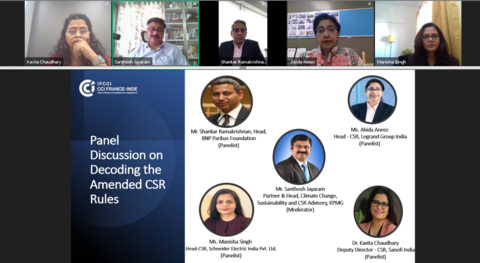Event report
Webinar cum Panel Discussion on Decoding the Amended CSR Rules

IFCCI under the aegis of its CSR Committee organized a Webinar cum Panel Discussion on Decoding the Amended CSR Rules on Friday, 12th March 2021.
DOWNLOAD A COPY OF EVENT COVERAGE
IFCCI under the aegis of its CSR Committee organized a Webinar cum Panel Discussion on Decoding the Amended CSR Rules on Friday, 12th March 2021 ,3:00 pm to 4:15 pm. The webinar began with opening remarks from Ms. Rishika Roy – Head Events & Membership (North), she welcomed all the speakers and participants for the day and thanked the knowledge partner – KPMG for their support.
Mr. Anurag Pratap, Chairman, IFCCI CSR Committee & Digital Inclusion & Sustainability Leader, Capgemini India gave the welcome address and highlighted the need to simplify the amended CSR Rules. Ms. Gurvinder B. Parmar, Chartered Accountant, KMPG gave a detailed presentation consisting of the overview of the CSR legislation in India, the reasons behind the changes and areas of key focus of this amendment. According to a survey done by KPMG in 2019 which comprised of top 100 companies in India showed non-compliance with the legislations, there were discrepancies and scope for improvement. Further the 5 areas of focus under this amendment are- CSR Definition , Shift from Directional to Mandatory CSR compliance, Registration requirement for implementing partners, Increased rigor for internal control and focus on impact creation.
Next the panel discussion was opened which aimed at understanding the perspective of Industries, impacts etc. and was moderated by Mr. Santhosh Jayaram - Partner & Head, Climate Change, Sustainability and CSR Advisory, KPMG, who also welcomed and introduced the panelists .The Panelists for the day were :
- Mr. Shankar Ramakrishnan, Head, BNP Paribas Foundation
- Ms. Abida Aneez, AVP-HR & CSR, Legrand
- Dr .Kavita Chaudhary, Deputy Director - CSR, Sanofi India
- Ms. Manisha Singh, GM & Head-CSR, Schneider Electric India Pvt ltd.
The first issue taken up was the planning cycle (3+1 year model) which will be in place of year on year compliance, Mr. Shankar Ramakrishnan remarked that this would allow the projects to follow a natural progression and the intention behind is compliance and uniformity however clarifications on projects that stretch beyond this time frame, operational challenges are awaited. Nevertheless this also comes with a positive impact that it would bring in more community partnership. Another big shift is the registration of the implementation partners, According to Ms. Kavita this change came in force because of the existing gap between the mature organisations versus the new, small organisations. The registration process would ensure that all organisations will be certified and verified by the government. Even so how will the due diligence will be conducted for all organisations is a clarification awaited. She pointed out that this would manifest as a challenge for organisations who don’t have registrations. On the other hand it’ll establish trust and credibility in the NGO’s on part of the corporate sector. Further the change in impact assessment was also deliberated upon: what is the standard template to measure impact, the cost of impact assessment, the clash with multi-year projects and a year to year impact evaluation were some of the challenges in foresight as highlighted by Mr. Shankar.
The discussion was followed by an interactive session and Q&A and a vote of thanks by Ms, Sumana Dasgupta, Advisor (IFCCI), Director- Corporate Partnerships, (HelpAge India).












